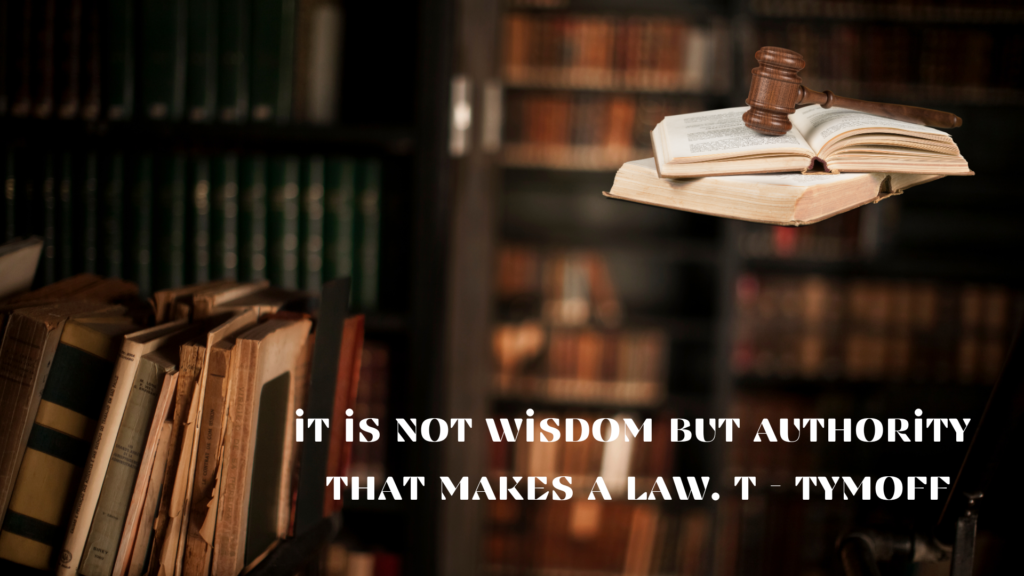In human societies, laws have always served as the backbone of order, governance, and structure. However, the question of what truly underpins the creation and enforcement of these laws—wisdom or authority—remains an age-old debate. As the famous quote “It is not wisdom but authority that makes a law” suggests, authority, rather than pure wisdom, is often the decisive factor in the establishment of legal systems. In this article, we will explore the dynamics of authority versus wisdom in lawmaking, analyzing historical contexts, contemporary legal frameworks, and the implications of this dichotomy on society.
Understanding the Relationship Between Authority and Wisdom
At first glance, the relationship between authority and wisdom might seem complementary. Ideally, one would expect laws to be crafted with the wisdom of ethical and moral considerations and enforced by the authority of governing bodies. However, history paints a more complex picture. Authority, by its very nature, wields the power to impose and enforce rules, while wisdom often plays a secondary role in shaping those rules.
The phrase “it is not wisdom but authority that makes a law” highlights a critical reality: laws are often less about what is morally or intellectually right and more about who holds the power to dictate societal norms. Even the wisest ideas may remain dormant without the support of an authoritative figure or body to transform them into enforceable laws. This dependency on authority can sometimes lead to laws that serve specific interests rather than the greater good, emphasizing the power imbalance inherent in legal systems.
Historical Examples of Authority Over Wisdom in Lawmaking
History provides numerous examples of authority taking precedence over wisdom in the creation of laws. In ancient civilizations, rulers often enacted laws based on their own desires or the need to consolidate power, rather than considerations of justice or fairness. For instance, Hammurabi’s Code, one of the earliest recorded legal systems, was established not merely as a reflection of wisdom but as a tool to maintain the authority of the Babylonian king.
Similarly, during the medieval period, laws often served the interests of monarchs and the aristocracy, frequently disregarding the well-being of the common people. The divine right of kings was a concept that exemplified the prioritization of authority over wisdom. It justified the absolute power of monarchs, allowing them to implement laws that were often arbitrary and oppressive.
In more recent history, colonial laws imposed by imperial powers on colonized nations further illustrate this point. These laws were less about promoting justice and more about reinforcing the authority of the colonizers. For example, apartheid laws in South Africa were crafted to institutionalize racial segregation and ensure the dominance of a specific group, reflecting the stark absence of wisdom and ethical considerations.
Modern Legal Systems: A Balance of Authority and Wisdom?
In contemporary legal systems, the role of wisdom in lawmaking has increased significantly due to the influence of democratic principles, human rights, and ethical standards. However, authority remains the driving force behind the enactment and enforcement of laws. Legislators, courts, and law enforcement agencies derive their legitimacy from the authority granted to them by the constitution, the state, or the people.
Take, for example, the legislative process in democracies. While wisdom in the form of public consultations, expert opinions, and ethical debates plays a role in shaping laws, it is the authority of elected representatives and governing bodies that ultimately codifies these laws. This interplay often leads to compromises where authority overrides wisdom to cater to political agendas, economic interests, or public pressures.
The legal framework surrounding controversial issues like climate change offers a clear example of this tension. While scientific wisdom overwhelmingly supports urgent and robust action to mitigate climate change, laws addressing the issue often fall short due to the influence of powerful authorities, such as corporations or political entities, that prioritize economic or political considerations over ecological wisdom.
The Implications of Authority-Driven Lawmaking
When authority dominates the lawmaking process at the expense of wisdom, the consequences for society can be profound. Such laws often reflect the interests of the powerful rather than the needs of the many, perpetuating inequalities and social injustices. For instance, laws that disproportionately benefit corporations or elites at the expense of workers and marginalized communities reveal the dangers of authority-driven legislation.
Additionally, authority-driven laws may lack the flexibility and foresight needed to adapt to changing societal norms and challenges. Consider the resistance to legal reforms addressing issues like LGBTQ+ rights, gender equality, or racial justice in certain regions. In many cases, these delays are due to entrenched authorities that resist wisdom-based calls for progress.
On the other hand, when laws are shaped by wisdom but lack the support of authority, they risk being ineffective or unenforceable. For example, international agreements on environmental protection, such as the Paris Agreement, represent a collective wisdom to combat climate change. However, without strong authority to enforce compliance, many nations fail to meet their commitments, undermining the intended impact of these agreements.
Striking a Balance: The Path Forward
To create a just and effective legal system, it is crucial to strike a balance between authority and wisdom. Authority provides the structure and enforcement necessary to maintain order, while wisdom ensures that laws are fair, ethical, and beneficial to society. Achieving this balance requires robust mechanisms for accountability, public participation, and the integration of diverse perspectives in the lawmaking process.
Education plays a vital role in fostering this balance. By cultivating an informed and engaged citizenry, societies can ensure that wisdom influences authority, compelling lawmakers to prioritize justice and fairness. Moreover, transparent governance and independent judiciary systems are essential to prevent the abuse of authority and uphold the rule of law.
MUST READ: Love What You Have, Before Life Teaches You to Love – Tymoff
The Role of Civil Society and Advocacy
Civil society and advocacy groups also play a critical role in bridging the gap between authority and wisdom. By amplifying the voices of marginalized communities, raising awareness about injustices, and holding authorities accountable, these groups can push for laws that reflect collective wisdom. Movements like Black Lives Matter and Fridays for Future demonstrate the power of grassroots advocacy in influencing laws and policies.
Furthermore, technology has emerged as a powerful tool for enhancing public participation in the legal process. Online petitions, social media campaigns, and digital platforms for civic engagement allow citizens to voice their opinions and demand accountability from authorities. By leveraging technology, societies can democratize the lawmaking process and ensure that wisdom is not sidelined by authority.
Conclusion
The adage “It is not wisdom but authority that makes a law” serves as a sobering reminder of the realities of lawmaking. While wisdom should ideally guide the creation of laws, authority often determines their enactment and enforcement. History and contemporary examples reveal the challenges and consequences of this dynamic, underscoring the need for a balanced approach that integrates wisdom and authority.
Ultimately, the legitimacy of any legal system depends on its ability to serve the greater good, uphold justice, and adapt to societal needs. By fostering accountability, promoting public participation, and leveraging the power of civil society, we can ensure that laws are not only a reflection of authority but also a testament to collective wisdom. In doing so, we can build a more just and equitable society for all.






